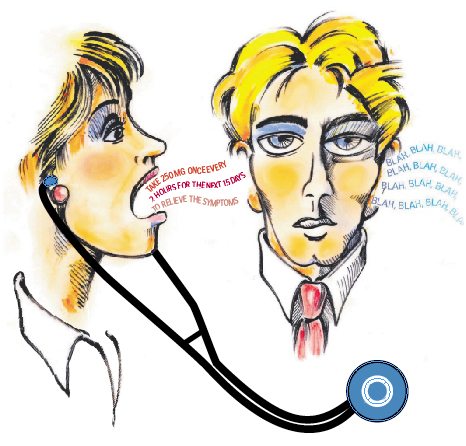On the Web
Legacy Health’s Clear initiative and information on an upcoming health literacy conference
What a physician says and what a patient hears can be two different things, especially for those among the nearly half of the U.S. adult population with low health literacy.
Health literacy is defined by the Institute of Medicine as the capacity to obtain, understand and process basic health information and services needed to make appropriate health decisions.
Nothing — not age, income, employment status, education level or racial group — affects health status more than literacy skills, according to the National Patient Safety Foundation.
“When patients don’t take their medications the way we think they are, things can get worse and sometimes quickly,” said Dr. Kelley Aurand, a family practitioner at Legacy Medical Group’s Fisher’s Landing clinic.
Legacy Health is combating health illiteracy with a new campaign called Clear: Communication, Literacy and Education Achieve Results. The goal is to promote health literacy awareness and provide tools to help patients overcome literacy challenges.
Low health literacy can mean patients don’t understand medication directions and, therefore, don’t take the proper doses. It can also mean they don’t understand their medical conditions and aren’t taking steps to control or prevent illnesses, Aurand said.
Those misunderstandings lead to sicker patients who need more expensive treatments and, sometimes, land in hospital emergency departments, she said.
“There’s a lot of embarrassment around this issue,” Aurand said. “Nobody wants to come out and say, ‘I can’t read this, I don’t understand what this says.’”
One way physicians can help improve patient literacy is to avoid the medical terminology that’s become part of their daily lives, said Barbe West, executive director of the Free Clinic of Southwest Washington. The Free Clinic serves low-income Clark County residents.
“When talking to patients, (physicians) need to take the time and double-check and make sure the patients understand the terminology,” West said.
“If something hasn’t been communicated by either the pharmacist or the physician, it can be very confusing,” she added.
As part of the Clear initiative, Legacy doctors such as Aurand are taking steps to help ensure patients understand their health care.
Patients are required to bring their medication bottles to each doctor visit. That way, physicians can make sure patients are taking the proper doses of medication and have accurate records of what medications are being used, Aurand said.
At the end of a visit, physicians print an after-visit summary that includes all of the details of the visit. The summaries are written in plain language — for example, using “high blood pressure” in place of “hypertension” — and can be modified to be printed in larger type, Aurand said.
Physicians can also ask a patient to repeat the directions they’ve given to ensure the patient understood the directions, she said.
The Fisher’s Landing clinic has a resource specialist on hand to help patients who have difficulty understanding medical forms or need help filling out medical assistance paperwork, Aurand said.
Patients can also take steps to ensure they’re receiving, and understanding, adequate information from their providers, she said.
For example, patients can bring a friend or family member with them to office visits and ask that person to take notes. The patient can then review the information later, Aurand said.
Patients can also ask physicians for pointers to credible websites or other resources for additional information. And, of course, ask the physician questions or for more explanation, she said.
West of the Free Clinic said improving health literacy is important not only for low-income patients but for everyone receiving health care. Ensuring that patients understand what they need to do to maintain good health will improve health outcomes, she said.
“I think it’s an area that needs to be tackled in the health care field,” West said, “and it’s been a long time coming.”
Marissa Harshman: 360-735-4546; http://twitter.com/col_health; http://facebook.com/reporterharshman; marissa.harshman@columbian.com.




